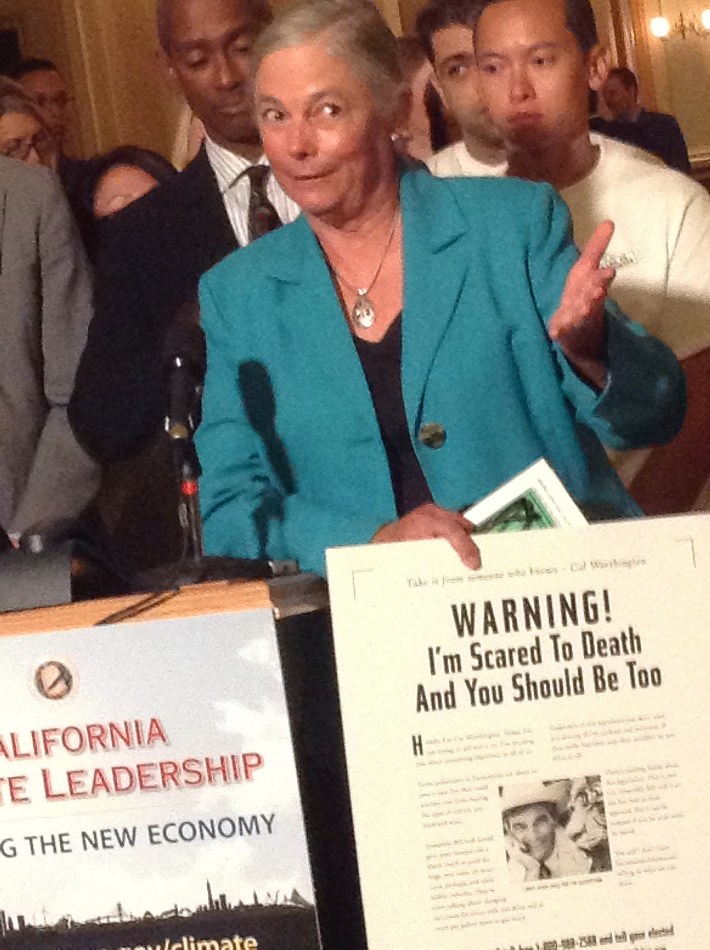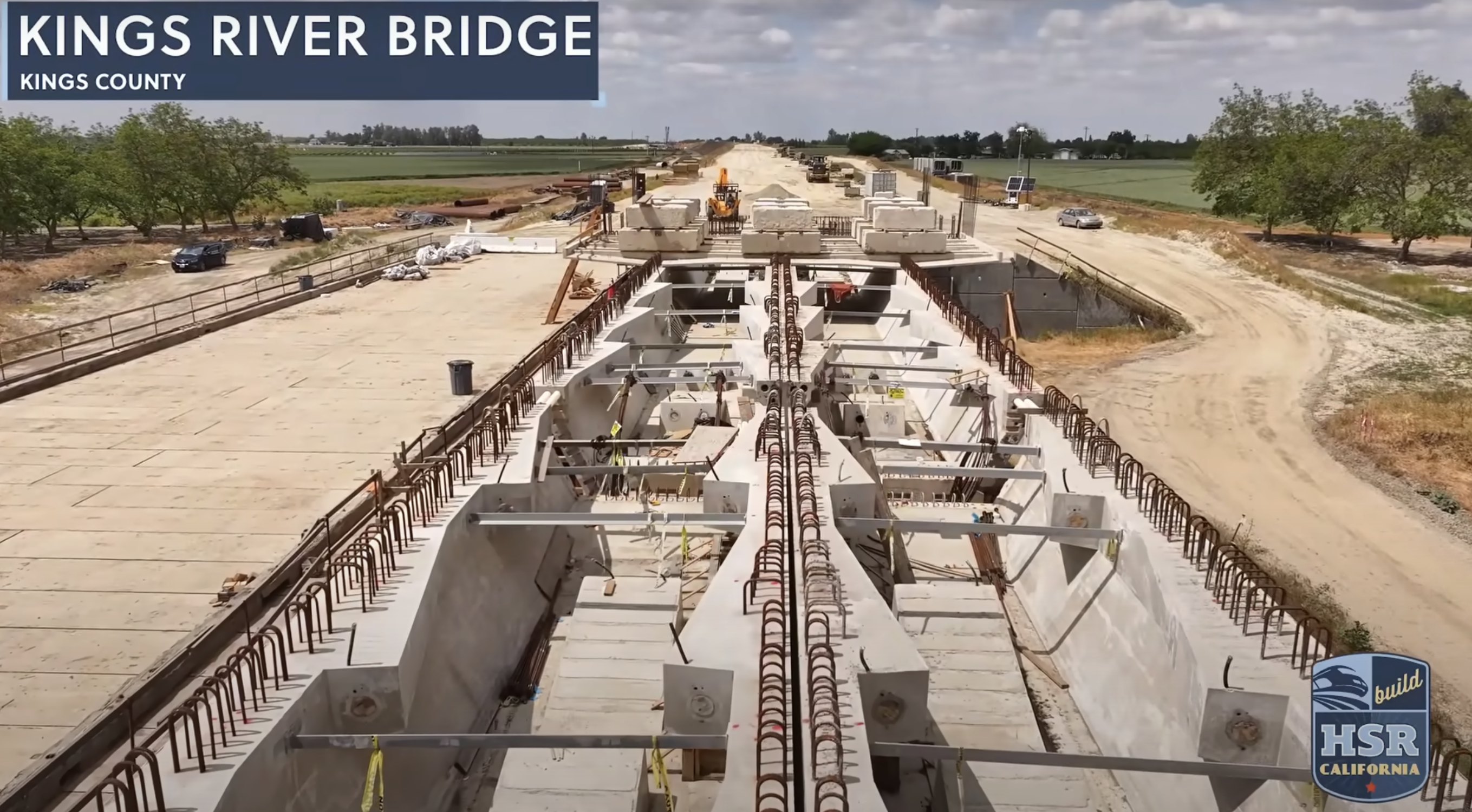Some members of the mainstream media seem to be enjoying a good rip on California's climate change policies, especially its cap-and-trade program, heralding its imminent collapse and describing Governor Jerry Brown as desperate and “nervous” about whether he can save it.
And some of those media pundits are going a little overboard, like the Los Angeles Times' in-house curmudgeon George Skelton when he derides High Speed Rail as Governor Brown's “choo-choo.”
But hold up there, cowboys. Yes, there is a pending court case about whether cap-and-trade is a tax—and therefore whether it needed to have passed with a 2/3 majority—but there are pretty good arguments against that reasoning, and the case has already been shot down once.
And sure, last spring's cap-and-trade auction was disappointing in terms of raising revenue, but greenhouse gas emission reductions from the cap are not affected by the amount of revenue collected in the trade. And while we still don't know the results of this week's auction, permits had recently been trading on the open market at a price above the auction's floor price. So let's not jump in to proclaim the program's demise quite yet.
Skelton's derisive column is not helpful in the midst of a proliferation of ramped-up pessimism and misleading allegations about cap-and-trade. Do we want California to do everything it can to reduce greenhouse gas emissions, or would we rather stand around arguing about it? We're kind of running out of time here.
(Note to the author of the above-linked nonsense, and like-minded people: stop it already with the “hidden gas tax” stuff. It's just silly. For one thing, any pass-along costs to consumers are minuscule compared to the fluctuations in gas prices we endure; and for another, consumers should be paying for cleaner air, since we're contributing to the problem by driving so much.)
In his race to the bottom, Skelton derides Governor Brown's various efforts to extend cap-and-trade as well as “to keep alive the unpopular bullet train project”—it is certainly unpopular at the Times—and dismisses out-of-hand the possibility of finding agreement on extending the program.
He quotes one unnamed, unidentified Democrat (a legislator? A staffer? Someone hanging out at a nearby coffee shop?) to back up his case that Brown has no support.
And he conflates the high-speed rail program with climate change legislation. They are not the same thing. Yes, right now the High Speed Rail program receives 25 percent of the money that comes from cap-and-trade, but it was never included as an element in the original Global Warming Solutions Act, A.B. 32, nor is it part of that law's potential successor now up in the legislature, S.B. 32.
That's not a “red flag,” as Skelton calls it. It's how the laws are meant to work. They set a target for greenhouse gas reductions, and that is all. One would think the pro-business Skelton would be happy with this—after all, it is what business interests requested from the legislature when A.B. 32 was passed.
But oil companies are frightened of those targets anyway, and react with panic and hot air. Which leads them to contradict themselves after the targets have been set, and claim that decisions about how to reach those targets are better made by politicians (legislators) than the subject-area experts and scientists (“unelected bureaucrats”) working for the California Air Resources Board.
Despite these tactics, S.B. 32 has plenty of support. Mayors across the state want it passed, because they can see its benefits for their cities. The Union of Concerned Scientists urge legislators to pass it. A long line of organizations, advocacy groups, business interests, and local government representatives show up to speak in support of the bill when it's presented in hearings. The Mercury-News wrote an editorial pointing out the high stakes involved if California drops the ball on its climate change policies. That editorial also makes a clear argument that, despite the oil lobby's many-pronged efforts to paint a different picture, A.B. 32 is succeeding in both lowering greenhouse gas emissions and contributing hugely to the California economy. Even the L.A. Times weighed in to urge lawmakers to pass the bill.
So it's not dead yet.
Mr. Skelton's drumbeat about that darn unpopular bullet train is likewise tiresome. The current senate proposal on cap-and-trade expenditures contains no “additional money for the bullet train" because that proposal only addresses the unallocated portion of revenues. Not because nobody supports the train. Just to be clear: High speed rail already gets 25 percent of the total, and no one expects the plan to contain “additional money for the bullet train.”
Note: Streetsblog is aware that cap-and-trade is not a panacea that's going to cure global warming, and there are a lot of reasons to be cautious about relying on a market mechanism to reduce emissions. But it's a far sight better than throwing up our hands and giving up, which seems to be the alternative solution offered by opponents of cap-and-trade, high speed rail, or anything that might cut into oil company profits or cause people to drive less.
That last bit sounds paranoid even to me. A little bit. But it isn't really. I'm not the only one who's been writing about the shenanigans of the oil industry lobbyists and how they're trying to manipulate the conversation around climate change policies.
And let's admit it, for once and for all: the biggest action any individual can take to fight climate change is to drive less.






